

Companion Planting Chart: Plant Companions for Vegetables. Hydrogen Peroxide Uses: How To Use (H2O2) In The Garden. Everyone is familiar with hydrogen peroxide uses as a topical antiseptic and a personal care product.
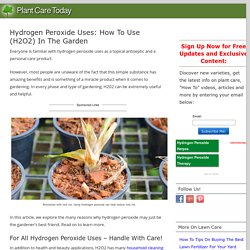
However, most people are unaware of the fact that this simple substance has amazing benefits and is something of a miracle product when it comes to gardening. In every phase and type of gardening, H202 can be extremely useful and helpful. Bromeliad with root rot. Using Hydrogen peroxide can help reduce root rot. In this article, we explore the many reasons why hydrogen peroxide may just be the gardener’s best friend. For All Hydrogen Peroxide Uses – Handle With Care! In addition to health and beauty applications, H2O2 has many household cleaning uses. H2O2 occurs naturally, however the commercially produced product is not considered organic.
For this reason it makes hydrogen peroxide a very environmentally friendly alternative to pesticides, fungicides and chemical fertilizers. Its Chemical Makeup… Very Similar To Water Water’s chemical name is H2O. Can You Use H2O2 Full Strength? Animal Welfare Institute. Rehoboth Ranch - Home. 2238 County Road 1081Greenville, Texas 75401(903) 450-8145 (Dallas metro) There is a place in Texas, outside the sleepy little town of Greenville, where the cock still crows and the cows still chew their cud.
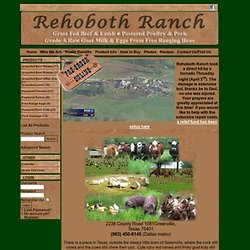
American Humane Certified: The Humane Touch. Ratings of Natural, Green and Healthy Products. Plant companions. Get Your Walk Score - A Walkability Score For Any Address. Use Vinegar and Baking Soda to Recharge Your Towels - Household - Lifehacker. Healthy and Green Living (Flea Reduction) Apple cider vinegar is my favorite new DIY household product.
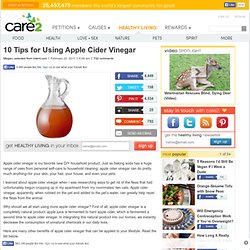
Just as baking soda has a huge range of uses from personal self-care to household cleaning, apple cider vinegar can do pretty much anything–for your skin, your hair, your house, and even your pets. I learned about apple cider vinegar when I was researching ways to get rid of the fleas that had unfortunately begun cropping up in my apartment from my roommates’ two cats.
Apple cider vinegar, apparently, when rubbed on the pet and added to the pet’s water, can greatly help repel the fleas from the animal. Why should we all start using more apple cider vinegar? First of all, apple cider vinegar is a completely natural product: apple juice is fermented to hard apple cider, which is fermented a second time to apple cider vinegar. Here are many other benefits of apple cider vinegar that can be applied to your lifestyle. Looking Out For All Animals - The Atlantic Food Channel. Photo by law_keven/Flickr CC Most people know NFL quarterback Michael Vick jeopardized his career and went to prison for violating animal cruelty laws.

What they likely don't realize is that unlike dogs and other pets, farm animals are virtually unprotected against cruelty, no matter how extreme. While every state in the country has animal anti-cruelty statutes on the books, most explicitly exempt farm animals. We think that should change. As just one example, consider the following. All of the pigs raised for Smithfield's pork spend their entire lives in metal buildings. This illustrates the problem with voluntary measures to improve animal welfare. Recognizing a growing unease about the conditions in industrialized farms in the United States, Smithfield announced with fanfare in 2007 that it would be phasing out the use of gestation crates for its sows. This illustrates the problem with voluntary measures to improve animal welfare. Canola Oil: A Product of Food Technology. Should you be consuming canola oil?
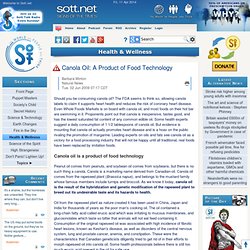
The FDA seems to think so, allowing canola labels to claim it supports heart health and reduces the risk of coronary heart disease. Even Whole Foods Markets is on board with canola oil, and most foods on their hot bar are swimming in it. Proponents point out that canola is inexpensive, tastes good, and has the lowest saturated fat content of any common edible oil. Some health experts suggest a daily consumption of 1 1/2 tablespoons of canola oil. But evidence is mounting that canola oil actually promotes heart disease and is a hoax on the public rivaling the promotion of margarine.
Natural Pesticides: Recipes & Tips. These homemade pesticides are cheap and easy to make with many being just as effective as some commercial products on the market.
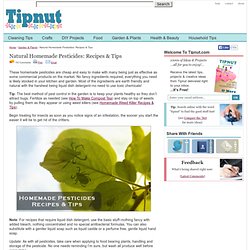
No fancy ingredients required, everything you need is likely stocked in your kitchen and garden. Most of the ingredients are earth friendly and natural with the harshest being liquid dish detergent–no need to use toxic chemicals! Tip: The best method of pest control in the garden is to keep your plants healthy so they don’t attract bugs. Fertilize as needed (see How To Make Compost Tea) and stay on top of weeds by pulling them as they appear or using weed killers (see Homemade Weed Killer Recipes & Tips). Begin treating for insects as soon as you notice signs of an infestation, the sooner you start the easier it will be to get rid of the critters.
Note: For recipes that require liquid dish detergent, use the basic stuff–nothing fancy with added bleach, nothing concentrated and no special antibacterial formulas. Rhubarb Leaf Mix Garlic Tea Tomato Leaves Mix. DIY Household Cleaners - The Green Guide.